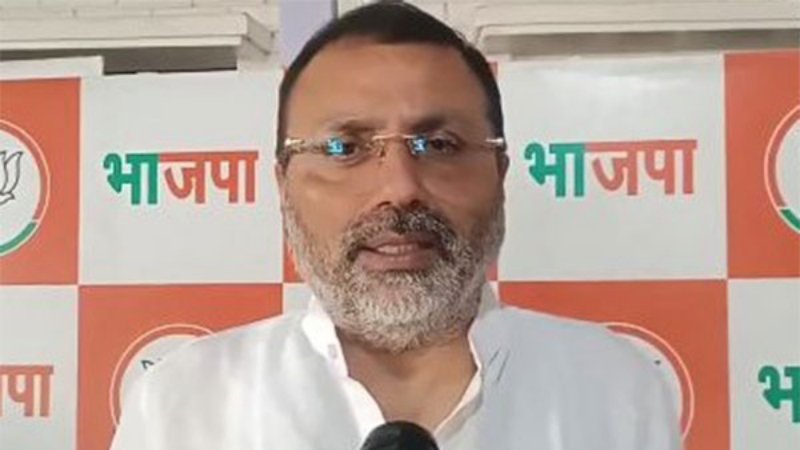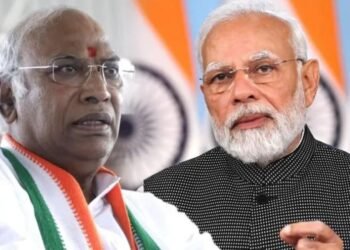In a sharply worded order, the Supreme Court described Dubey’s comments as a deliberate and reckless attempt to shake the public’s faith in the courts. Referring to his remarks as “highly irresponsible” and “ignorant,” the bench led by CJI Khanna emphasized that constitutional courts cannot be intimidated or discredited through political grandstanding
BY PC Bureau
The Supreme Court has strongly criticized BJP MP Nishikant Dubey for his inflammatory remarks against the apex court and Chief Justice of India (CJI) Sanjiv Khanna over the latter’s handling of the Waqf (Amendment) Act, 2025 case (Vishal Tiwari vs Union of India).
In an order dated May 5, a bench comprising CJI Khanna and Justice PV Sanjay Kumar expressed deep concern over Dubey’s public comments, describing them as a deliberate attempt to erode public trust in the judiciary. The Court emphasized that such remarks were intended to undermine judicial authority and discredit the legal system in the eyes of the public.
Dubey, in an interview with ANI, had accused the CJI of being “responsible for all civil wars happening in India” and suggested that the Supreme Court was inciting religious conflict. The bench unequivocally condemned these statements, calling them an affront to judicial dignity.
“These statements no doubt tend to scandalize and lower the authority of the Supreme Court of India… and have the tendency to interfere and obstruct the administration of justice,” the bench stated.
#BREAKING #SupremeCourt deprecates BJP MP Nishikant Dubey’s comments against the Judiciary and the CJI, says the comments were “highly irresponsible”.
At the same time, the bench led by CJI Khanna refrains from taking action, saying public confidence cannot be shaken by “such… pic.twitter.com/OkUlzFGHKB
— Live Law (@LiveLawIndia) May 8, 2025
While the Court refrained from initiating contempt proceedings, it made it clear that Dubey’s comments did not qualify for protection under Sections 3 and 4 of the Contempt of Courts Act, 1971, which outline exceptions for fair criticism and reporting.
“There is no ‘civil war’ in India,” the Court observed, calling the remarks “highly irresponsible” and reflective of a pattern of attention-seeking behavior that casts aspersions on the judiciary.
The Court also noted that Dubey’s statements demonstrated a “profound ignorance” of the role and responsibilities of constitutional courts.
ALSO READ: India Foils Pakistani Air Strike on 15 Cities, Hits Back
Crucially, the bench emphasized the need to act firmly against hate speech and communal provocation:
“Any attempt to spread communal hatred or indulge in hate speech must be dealt with an iron hand… It erodes tolerance and open-mindedness, which is essential in a multi-cultural society committed to equality.”
The comments were brought to the Court’s attention by Advocate Vishal Tiwari, who urged suo motu contempt proceedings against Dubey, citing violations under both the Contempt of Courts Act and the Bharatiya Nyaya Sanhita. Tiwari argued that Dubey’s comments were part of a growing trend where political leaders target the judiciary with hate speech and unfounded allegations.
While declining to take contempt action at this stage, the Court reiterated that its authority and public confidence are not so fragile as to be shaken by “absurd” statements.
“We do not believe that the credibility of the courts in the eyes of the public can be shaken by such absurd statements, though there is clearly a desire to do so,” the bench noted.
The Court also used the opportunity to reflect on its broader role in a democracy. It emphasized that judicial strength lies in restraint and adherence to constitutional values—not in retaliating against every provocation.
“Not every act of contempt must be met with punishment. Judges must trust in the strength of their reasoning and the public’s discernment to distinguish between genuine critique and malicious attacks.”
The bench reaffirmed the supremacy of the Constitution and the role of judicial review as a cornerstone of Indian democracy. It also highlighted that all court decisions are subject to mechanisms like appeal, review, and curative petitions, underlining that transparency and accountability are inherent to the judicial process.
“This built-in mechanism of accountability is a defining strength of the judiciary—one rooted in public trust and the rule of law.”
Meanwhile, another contempt plea against Dubey related to similar comments is pending before the Supreme Court.














